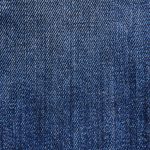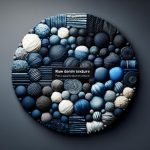Are you in search of the perfect denim fabric? Look no further! In this article, we will explore the different types of denim fabrics available, helping you make an informed decision.
We’ll discuss the factors to consider when choosing denim, the pros and cons of stretch denim, the durability of raw denim, the comfort of lightweight denim, and the unique look of selvedge denim.
We’ll also delve into popular denim blends and their benefits.
Get ready to find the denim fabric that suits your style and needs!
Table of Contents
Different Types of Denim Fabrics
There’s a wide variety of denim fabrics to choose from. When it comes to the types of denim washes, you have several options. The most common ones include light wash, medium wash, dark wash, and black wash.
Light wash denim has a faded and worn-out appearance, perfect for achieving a casual and relaxed look. Medium wash denim strikes a balance between light and dark wash, offering versatility and a timeless appeal. Dark wash denim is known for its deep indigo color and is often seen as more formal and sophisticated. Black wash denim, as the name suggests, is dyed black and creates a sleek and modern look.
If you’re looking for eco-friendly denim options, there are a few alternatives available. Organic cotton denim is made from cotton grown without the use of harmful pesticides or chemicals, making it a more sustainable choice. Recycled denim is another option, which involves using post-consumer or post-industrial denim waste to create new fabrics. This reduces the need for raw materials and minimizes environmental impact. Additionally, some brands offer denim made from alternative fibers like hemp or linen, which have a lower environmental footprint compared to traditional cotton denim.
Overall, understanding the different types of denim washes and exploring eco-friendly options can help you make an informed decision when choosing the best denim fabric for your needs and values.
Factors to Consider When Choosing Denim Fabric
When considering different denim fabrics, you should take into account various factors. The type of denim fabric you choose can greatly impact the final product, whether it’s eco-friendly fashion or athletic wear. Here are three important factors to consider:
-
Durability: For athletic wear, you need a denim fabric that can withstand rigorous activities and frequent washing. Look for fabrics with a high thread count and a strong weave to ensure longevity.
-
Moisture-wicking: When it comes to athletic wear, it’s important to choose a denim fabric that is moisture-wicking. This means it can effectively pull sweat away from the body, keeping you dry and comfortable during workouts.
-
Sustainable production: If you’re looking for denim fabric for eco-friendly fashion, consider fabrics made from sustainable materials like organic cotton or recycled denim. Look for certifications such as GOTS (Global Organic Textile Standard) or Oeko-Tex Standard 100 to ensure the fabric meets certain environmental and social standards.
Pros and Cons of Stretch Denim
To make an informed decision about stretch denim, you should consider the pros and cons of this type of fabric.
Stretch denim offers several advantages that make it a popular choice among consumers. One of the main advantages is its comfort. The addition of spandex or elastane fibers allows the fabric to stretch and move with your body, providing a greater range of motion and flexibility. This makes it ideal for activities that require a lot of movement, such as dancing or exercising.
Another advantage of stretch denim is its ability to provide a more flattering fit. The stretchy nature of the fabric helps to smooth out any lumps or bumps, creating a slimmer and more streamlined silhouette. Additionally, stretch denim tends to be more forgiving in terms of sizing. The fabric has some give, which means it can accommodate slight fluctuations in weight without feeling too tight or uncomfortable.
However, there are also some disadvantages to consider. Stretch denim tends to lose its shape over time, especially if it is not properly cared for. The spandex or elastane fibers can break down with repeated wear and washing, causing the fabric to stretch out and lose its elasticity. This can result in a saggy and baggy appearance, which is not ideal for a garment that is meant to be form-fitting.
Another disadvantage is that stretch denim can be more prone to pilling. The constant rubbing and friction against other surfaces can cause small balls of fibers to form on the fabric, giving it a worn and unkempt look. Additionally, stretch denim may not be suitable for all body types. While it can provide a flattering fit for many people, it may not be as forgiving for those with larger or more curvaceous figures.
It is important to consider these pros and cons when deciding whether or not to choose stretch denim for your clothing needs.
The Durability of Raw Denim
If you’re looking for a durable option, raw denim is a great choice. Unlike distressed denim, raw denim is known for its strength and longevity. Here are some reasons why raw denim is a top pick when it comes to durability:
-
High-quality fibers: Raw denim is made from high-quality cotton fibers that have not been pre-washed or treated, making it more resistant to wear and tear.
-
Tight weave: The tight weave of raw denim adds to its durability, preventing the fabric from easily fraying or ripping.
-
Natural fading: Raw denim develops unique fading patterns over time, which adds character to the fabric without compromising its strength.
-
Customization: Raw denim allows you to customize your jeans to your body shape and lifestyle. As you wear them, they mold to your body, creating a personalized fit that enhances comfort without sacrificing durability.
While raw denim may initially feel stiff and less comfortable compared to distressed denim, it softens and becomes more comfortable over time as it breaks in. So, if you’re willing to invest in a pair of jeans that will last for years and develop a unique patina, raw denim is the way to go.
The Comfort of Lightweight Denim
For a more comfortable option, lightweight denim is perfect for those hot summer days when you want to stay cool and stylish. Lightweight denim offers many advantages over traditional denim fabrics, making it a popular choice for both casual and dressy outfits.
One of the main advantages of lightweight denim is its breathability. The fabric is thin and allows air to flow freely, keeping you cool and comfortable even in the sweltering heat. Additionally, lightweight denim is softer and more flexible than heavier denim, allowing for greater ease of movement. This makes it ideal for activities that require a lot of mobility, such as dancing or outdoor sports.
Styling options with lightweight denim are endless. You can pair a lightweight denim shirt with shorts or a skirt for a casual, laid-back look. For a more polished outfit, try wearing lightweight denim trousers with a crisp white blouse and heels. Lightweight denim jackets are also a versatile piece that can be layered over dresses or paired with jeans for a trendy double denim ensemble. The fabric’s lightweight nature allows for easy layering without feeling bulky or weighed down.
The Unique Look of Selvedge Denim
You’ll love the distinct appearance of selvedge denim, with its signature self-edge that adds a touch of uniqueness to your jeans. Selvedge denim is a type of denim fabric that is woven on narrow shuttle looms, resulting in a clean and tightly woven edge.
Here are three reasons why selvedge denim is worth considering:
-
Quality and Durability: Selvedge denim is known for its exceptional quality and durability. The tight weaving technique creates a denser fabric that is less prone to fraying and tearing, ensuring that your jeans will last longer.
-
Unique Fading Patterns: Selvedge denim tends to develop unique fading patterns over time due to its tightly woven construction. This means that your jeans will age beautifully and develop a personalized look that is specific to you.
-
Versatile Styling Options: Selvedge denim can be dressed up or down, making it a versatile wardrobe staple. Pair it with a crisp white shirt and dress shoes for a sophisticated look, or go for a more casual vibe by pairing it with a graphic tee and sneakers.
When styling selvedge denim, it’s important to keep in mind that it typically has a stiffer feel compared to other denim fabrics. To break it in and achieve a more comfortable fit, wear your jeans frequently and allow them to naturally mold to your body shape.
Popular Denim Blends and Their Benefits
Now that you have learned about the unique look of selvedge denim, let’s explore popular denim blends and their benefits. When it comes to choosing the best denim fabric, there are several factors to consider, including sustainability and how well it suits different body types.
Sustainable denim options have gained popularity in recent years, as more people are becoming conscious of the environmental impact of fashion. Brands are now using organic cotton, recycled denim, and innovative dyeing processes to reduce water consumption and chemical use. These sustainable options not only help protect the planet but also offer excellent quality and durability.
Additionally, different body types require different denim fabrics for the most flattering fit. To give you a clearer picture, here is a table showcasing three popular denim blends and their benefits:
| Denim Blend | Benefit |
|---|---|
| Stretch Denim | Provides flexibility and comfort for a wide range of body types. |
| Rigid Denim | Offers a structured and classic look, ideal for those with a slim build. |
| Curvy Denim | Designed with extra room in the hips and thighs, perfect for curvier body types. |
Conclusion
In conclusion, when it comes to choosing the best denim fabric, there are several factors to consider.
The type of denim, such as stretch, raw, lightweight, or selvedge, all have their own advantages and disadvantages. It ultimately depends on your personal preferences, style, and needs.
It’s important to consider factors like durability, comfort, and the unique look that each type of denim offers. Additionally, popular denim blends can provide additional benefits.
By weighing these factors, you can make an informed decision and find the perfect denim fabric for you.
- How Does Ring Spun Cotton Affect Garment Fit and Shape Retention? - August 13, 2024
- What Are the Challenges in Producing Ring Spun Cotton? - August 13, 2024
- Is Ring Spun Cotton Suitable for Plus-Size Clothing? - August 13, 2024





